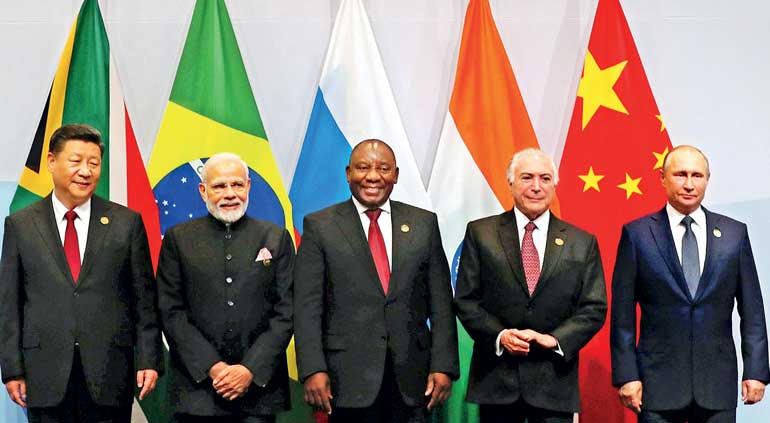Monday Feb 16, 2026
Monday Feb 16, 2026
Tuesday, 5 July 2022 03:03 - - {{hitsCtrl.values.hits}}

 The recent BRICS Summit of 2022, held on 23-24 June under the Chairmanship of China, took place at a time of increasing tensions between the West and both Russia and China, two members of the BRICS representing 75% of the group’s GDP.
The recent BRICS Summit of 2022, held on 23-24 June under the Chairmanship of China, took place at a time of increasing tensions between the West and both Russia and China, two members of the BRICS representing 75% of the group’s GDP.
A Western analyst writing on the summit points out that NATO’s Strategic Concept of 2022 considers Russia “the most significant threat to the alliance” and that it sees the growing partnership between China and Russia as violating its “values and interests” (Chris Devonshire Ellis – Silk Road Briefings). Pertinent to the aspirations of the BRICS grouping, he also writes that NATO believes that China strives to control global logistics and even the global economy, thereby undermining the current global order.
BRICS, a coalition of states comprising of Brazil, Russia, India, China, South Africa, which held its first summit in 2009, has as one of its stated aspirations, “Strengthening and Reforming Global Governance”, as reaffirmed in its joint declaration at the conclusion of the 14th summit this year. It elaborates this aspiration, inter alia, as: “Making instruments of global governance more inclusive, representative and participatory to facilitate greater and more meaningful participation of developing and least developed countries, especially in Africa, in global decision-making processes and structures and make it better attuned to contemporary realities.”
India
NATO fears that “The deepening strategic partnership between the People’s Republic of China and the Russian Federation and their mutually reinforcing attempts to undercut the rules-based international order run counter to our values and interests.” (NATO Strategic Concept 2022).
This makes India’s role in the BRICS coalition somewhat problematic for NATO. Foreign Policy Magazine hastens to advise India that it can “pledge support for BRICS activities…while banking on the likelihood that BRICS won’t move quickly on implementing them—sparing New Delhi from putting itself at odds with the West.” (Michael Kugelman, Foreign Policy’s weekly South Asia Brief)
India’s clear sense of its own role in global affairs, reinforced by its insistence on “strategic autonomy” will enable it to chart its own independent course. It has proven skills to deftly balance all considerations in its dealings with both Russia and China, in its bilateral relationships as well as within BRICS.
Some Indian analysts have their own reading of the context in which BRICS is called upon to succeed. Sudheendra Kulkarni, a former close aide to Ex-PM Vajpayee, writes that “financial resources are heavily concentrated in the US and some West European countries, whereas the centre of gravity of the forces that drive the world’s productive economy (agriculture, manufacturing, services, human labour and even technology) is rapidly shifting to Asia, Africa and Latin America. This imbalance must be corrected for the Global Development Initiative to make rapid strides. This will blunt and eventually neutralise the West’s policy of weaponising its financial power to impose illegitimate sanctions, break global supply chains and practice ‘market apartheid’ against its political adversaries.” He believes that BRICS has a significant role to play in “democratizing the global order in the 21st century”. (India Tribune).
In an editorial, The Hindu noted signs of BRICS progress “such as the emergence of the New Development Bank (NDB)”. It concludes that “there remains a strong convergence of interests amid undeniable differences. Prime Minister Narendra Modi described the binding glue as “a similar approach to global governance”.
BRICS+
The West’s pessimism about BRICS is not shared by some important countries in the non-Western world.
At this year’s summit, China mooted the idea of an expanded BRICS, dubbed “BRICS+” (BRICS Plus). Ahead of the BRICS summit, at the meeting of Foreign Ministers of BRICS, a number of other potential members participated as guests at China’s invitation. They were Saudi Arabia, Argentina, Egypt, Indonesia, Kazakhstan, Nigeria, Senegal, Thailand and the United Arab Emirates. It was reported that two of those countries, Argentina and Iran, had applied for membership, even though discussions on the criteria and other requirements for membership are still on-going.
The BRICS intention to work together with the SCO (Shanghai Cooperation Organization) and G20 to achieve their common goal of a transformed world order has caused concern in the West.
Newsweek’s Tom O’Conner wrote “As NATO Grows, China and Russia Seek to Bring Iran, Saudi Arabia into the Fold”. He interprets the expansion of BRICS as Beijing and Moscow “looking to take on new members of their own, including Iran and Saudi Arabia” which he thought “could have a significant impact on global geopolitical balance.”
Mohammed al-Hamed, president of the Saudi Elite group in Riyadh, was reported in Newsweek as noting that if Saudi Arabia also joins BRICS+, it “will balance the world economic system, especially since the Kingdom of Saudi Arabia is the largest exporter of oil in the world, and it’s in the G20.”
Newsweek quotes Matthew Neapole, an international affairs expert who notes that “The BRICS and the SCO share one important ideological quality: they are both focused on multipolarity…Both are angling to act as force multipliers for this drive for multipolarity, to help along with alternatives [i.e., in currency or banking].” He adds that “If it can be successful in positioning itself as the standard-bearer of the Global South or G20, develop strong organizational mechanisms and integrate more thoroughly, it could be quite influential.”
Despite some of the West’s misgivings, BRICS’s potential to influence global governance and the global economy is significant, and will increase with expanding membership.
Addressing the BRICS Business Forum ahead of the 2022 summit, President Putin reminded his audience that collectively the BRICS countries are home to more than 3 billion people, account for a quarter of the global GDP and 20% of global Trade, 25% of direct investments, and as of the beginning of 2022, hold 35% of the world’s reserves. He also informed them that in the first three months of this year, trade between Russia and the BRICS countries had increased by 38% ($ 45 billion).
India, Sri Lanka’s closest neighbour will soon open its chain-stores in Russia, as negotiations are underway currently. Russian oil sales to both India and China have increased significantly.
Despite the obvious differences in size and circumstance, Sri Lanka has much to learn methodologically from India, if it is to survive its current catastrophic trajectory. India’s Foreign Secretary, Dr. Jaishankar, in a recent interview gave a masterclass on how to prioritise its national interest and intelligently negotiate its “strategic autonomy”.
Addressing the BRICS Summit Prime Minister Modi declared that by 2025, India’s digital sector value will cross $ 1 trillion. He also disclosed that India expects a 7.5% growth rate “which makes it the fastest growing major economy” adding that “transformative changes are taking place in every sector of emerging New India.”
On 1 July, as agreed at the June BRICS summit, Prime Minister Modi and President Putin had a telephone conversation which according to the Russian Foreign Ministry, “paid special attention to further development of mutually beneficial economic relations” and the “comprehensive strengthening of particularly privileged strategic partnership”.
President Putin addressing the BRICS Business Forum revealed that agricultural co-operation between the BRICS members is growing dynamically, Russia exports considerable amounts of fertilizer to BRICS states, and that Russian IT companies are expanding their activities in those countries.
BRICS is also exploring the possibility of creating an international reserve currency based on a basket of BRICS currencies. In addition, Russian Financial Messaging System is open for connection with the banks of BRICS countries.
Beijing Declaration
China as Chairman, named the theme for this year’s summit as “Foster High-quality BRICS Partnership, Usher in a New Era for Global Development”. The work seems to have already started. In relation to Sri Lanka’s current preoccupations, the concept paper included among others the development of bond markets by establishing the BRICS Local Currency Bond Fund to enhance capabilities in responding to financial risks” and anti-corruption mechanisms in order to “cooperate in such areas as asset recovery, denial of safe havens for corrupt persons and identification of proceeds of corruption and enhance anti-corruption capacity building through various education and training programs.”
The declaration of the BRICS Heads of State, called the Beijing Declaration, sets out the priorities. It hopes to “promote multilateralism, strengthen macroeconomic policy coordination, work together to foster an open and innovative world economy, maintain steady and unimpeded industrial and supply chains, and boost world economic recovery, with a view to achieving stronger global development.”
For global economic governance, the Declaration called for the “broadening and strengthening the participation of emerging markets and developing countries (EMDCs) in the international economic decision-making and norm-setting processes.” It calls for “macro-policy coordination in driving the world economy out of the crisis” and committed to “a strong and effective Global Financial Safety Net with a quota-based and adequately resourced IMF at its centre.”
Sri Lanka, in its desperate effort to overcome its current tragic destiny, may find these developments to its advantage, and could choose to make use of them, using the good offices of three of BRICS’ most important members, India, China and Russia.
(The writer is author of ‘Mission Impossible – Geneva’, Vijitha Yapa, Colombo, 2017.)